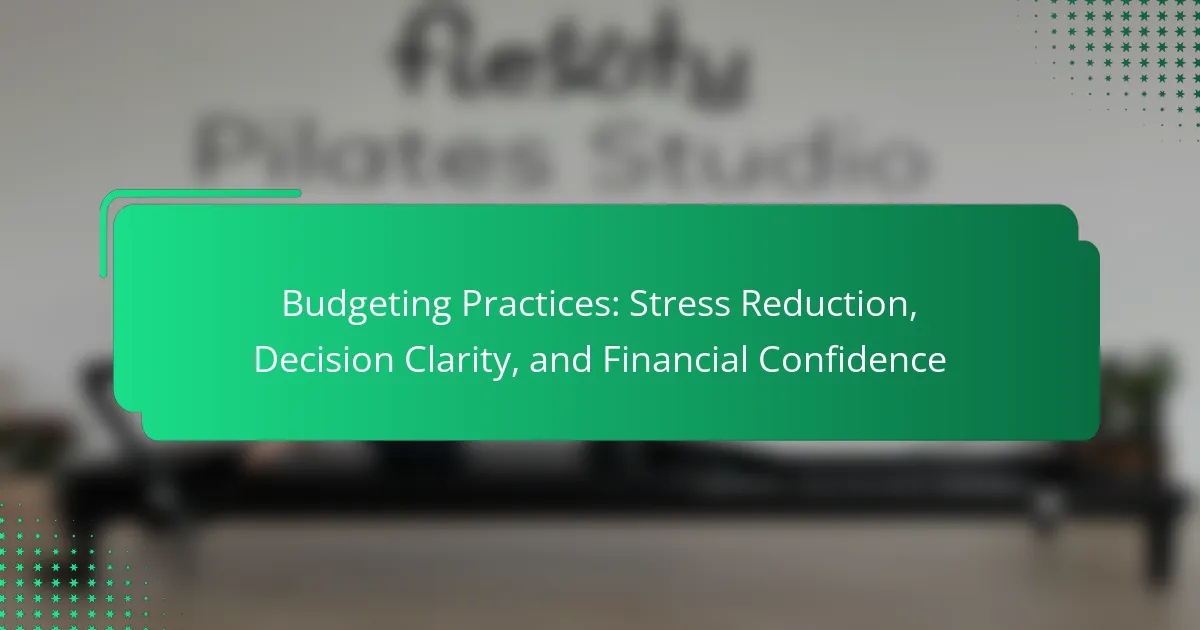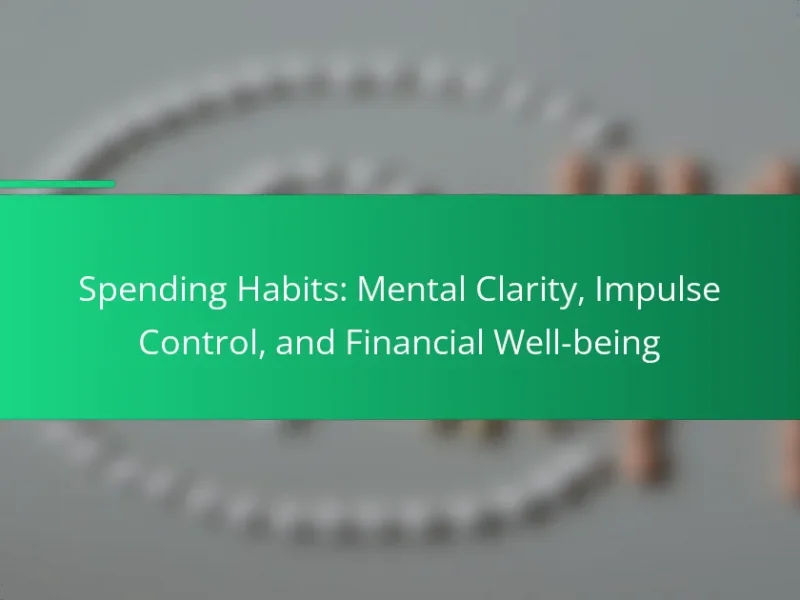Effective budgeting practices can significantly reduce stress and enhance financial confidence. They provide clarity in decision-making, helping individuals set and achieve financial goals. Key strategies include structured goal-setting, real-time tracking, and innovative approaches like zero-based and envelope budgeting. Utilizing budgeting tools can streamline the process and improve overall financial health.

How do budgeting practices reduce stress?
Budgeting practices significantly reduce stress by providing financial clarity and fostering confidence. They help individuals make informed decisions, leading to a sense of control over their finances. A structured budget can alleviate anxiety by setting clear spending limits and goals. As a result, individuals experience reduced financial uncertainty, which contributes to overall well-being.
What psychological benefits arise from effective budgeting?
Effective budgeting reduces stress, clarifies decision-making, and enhances financial confidence. By establishing clear financial goals, individuals experience less anxiety about money. Budgeting allows for informed choices, leading to greater satisfaction with financial decisions. This practice fosters a sense of control, which contributes to increased self-esteem and overall well-being.
How can budgeting alleviate financial anxiety?
Budgeting alleviates financial anxiety by providing structure, clarity, and control over finances. It helps individuals prioritize spending, track expenses, and set achievable savings goals. This practice fosters decision clarity, reducing uncertainty about financial choices. As a result, individuals gain confidence in managing their money, leading to decreased stress levels. Research indicates that people who budget regularly experience lower anxiety related to financial matters, enhancing overall well-being.
What role does tracking expenses play in stress reduction?
Tracking expenses significantly reduces stress by providing clarity on financial decisions. This practice enhances financial confidence, allowing individuals to make informed choices. As a result, individuals experience less anxiety about their financial situation. Regularly monitoring expenses can also identify spending patterns, helping to uncover areas for improvement. This unique attribute of expense tracking empowers individuals to align their spending with their financial goals, further alleviating stress.
How does setting financial goals contribute to peace of mind?
Setting financial goals significantly enhances peace of mind by providing direction and reducing uncertainty. Clear financial objectives foster better budgeting practices, leading to stress reduction. This clarity allows for informed decision-making, which boosts financial confidence. Consequently, individuals feel more secure in their financial futures, knowing they have a plan in place to achieve their aspirations.

What clarity do budgeting practices bring to decision-making?
Budgeting practices enhance decision-making by providing clarity on financial resources and priorities. They help individuals and organizations identify their spending patterns, set achievable goals, and allocate funds effectively. This structured approach reduces stress and fosters confidence in financial choices. As a result, informed decisions become easier, leading to improved financial health and stability.
How does budgeting improve financial decision clarity?
Budgeting enhances financial decision clarity by providing a structured overview of income and expenses. This structure allows individuals to prioritize spending, identify unnecessary costs, and allocate resources effectively. As a result, clearer financial choices emerge, leading to reduced stress and increased confidence in managing finances. Regularly reviewing a budget reinforces this clarity, enabling adjustments based on changing circumstances or goals.
What tools enhance decision-making in budgeting?
Effective tools for enhancing decision-making in budgeting include financial planning software, spreadsheets, and budgeting apps. These tools provide real-time data analysis, enabling users to track expenses and forecast future financial scenarios. For instance, budgeting apps often feature visual aids like graphs and charts, which clarify spending patterns and promote informed choices. Utilizing these tools can lead to reduced stress, clearer decision-making, and increased financial confidence.
How can visual aids support budgeting decisions?
Visual aids enhance budgeting decisions by providing clarity and reducing stress. They help visualize financial data, making it easier to understand complex information. Graphs and charts can represent spending patterns, enabling users to identify trends and make informed choices. This visual representation fosters financial confidence, as individuals can see their progress and adjust plans accordingly.
What role does prioritization play in effective budgeting?
Prioritization is crucial in effective budgeting as it ensures resources are allocated to the most important areas first. This approach reduces stress by clarifying decision-making and enhances financial confidence. By focusing on essential expenses, individuals can manage their finances more effectively and avoid unnecessary debt. Prioritization also allows for better long-term planning, ensuring that savings and investments align with personal goals.

What unique attributes enhance financial confidence through budgeting?
Unique attributes that enhance financial confidence through budgeting include structured goal-setting, real-time tracking, and personalized spending categories. These practices reduce stress by providing clarity in decision-making and fostering a sense of control over finances. For instance, individuals with specific savings goals report higher confidence levels, as they can measure progress effectively. Additionally, utilizing budgeting apps that offer visual insights can enhance understanding and commitment to financial plans, reinforcing positive financial behaviors.
How does regular budgeting foster a sense of control?
Regular budgeting fosters a sense of control by providing clarity over financial decisions and reducing stress. It allows individuals to track income and expenses, leading to informed choices. This practice enhances financial confidence, enabling proactive management of resources. As a result, individuals feel empowered to meet their financial goals and adjust plans as needed.
What impact does budgeting have on long-term financial security?
Budgeting significantly enhances long-term financial security by promoting disciplined spending and saving. Effective budgeting practices reduce stress by providing clarity on financial decisions. Individuals who budget are more likely to experience increased financial confidence, enabling them to plan for future expenses and investments. This proactive approach can lead to improved financial stability and wealth accumulation over time.
How can budgeting practices build resilience against financial setbacks?
Budgeting practices enhance resilience against financial setbacks by providing structure and clarity. They reduce stress, enabling better decision-making during crises. Effective budgeting fosters financial confidence, allowing individuals to navigate unexpected challenges with greater ease. Regularly reviewing budgets can also reveal areas for cost-cutting, ensuring resources are available when needed most.
What unique budgeting methods can boost confidence?
Unique budgeting methods that can boost confidence include zero-based budgeting, envelope budgeting, and the 50/30/20 rule. Zero-based budgeting requires justifying every expense, promoting awareness and control. Envelope budgeting allocates cash for specific categories, encouraging discipline. The 50/30/20 rule simplifies allocation into needs, wants, and savings, enhancing clarity and decision-making. Each method fosters financial awareness, reducing stress and increasing confidence in managing personal finances.

What rare budgeting practices can lead to exceptional outcomes?
Rare budgeting practices can significantly enhance financial outcomes through innovative strategies. One such practice is zero-based budgeting, where every expense must be justified for each new period, promoting accountability and resource allocation efficiency. Another rare approach is envelope budgeting, which involves allocating cash for specific spending categories, helping individuals control their expenses and reduce financial stress. Additionally, implementing a rolling budget allows for continuous adjustments based on actual performance, encouraging adaptability and informed decision-making. These practices foster decision clarity and build financial confidence, leading to exceptional outcomes.
What uncommon budgeting strategies yield surprising benefits?
Uncommon budgeting strategies can enhance stress reduction, decision clarity, and financial confidence. Implementing methods like zero-based budgeting can lead to more intentional spending, fostering a sense of control. Another unique approach is the envelope system, which segments cash for specific expenses, reducing anxiety over overspending. Finally, incorporating a “no-spend” challenge can promote mindfulness in spending habits, ultimately boosting financial confidence.
How can niche budgeting tools enhance financial literacy?
Niche budgeting tools enhance financial literacy by providing tailored insights and actionable strategies. These tools simplify complex financial concepts, making them accessible and relatable. Users gain stress reduction through organized financial tracking, which fosters decision clarity. This clarity translates into improved financial confidence, empowering individuals to make informed choices. By focusing on specific budgeting needs, these tools address unique financial situations, enhancing overall financial understanding.
What innovative budgeting approaches are emerging in 2025?
Innovative budgeting approaches in 2025 focus on integrating technology and behavioral insights. These methods enhance stress reduction, improve decision clarity, and boost financial confidence. Digital tools utilize AI to analyze spending patterns, offering personalized recommendations. Gamification elements encourage users to engage with their finances, making budgeting more interactive. Collaborative budgeting platforms enable families and teams to set shared goals, fostering accountability. Additionally, emotional budgeting techniques help individuals align their spending with personal values, reducing financial anxiety.

What best practices can enhance budgeting effectiveness?
Effective budgeting practices enhance financial confidence, reduce stress, and provide clarity in decision-making. Key strategies include setting clear financial goals, tracking expenses diligently, and regularly reviewing budgets. Utilizing budgeting tools can streamline this process, making it easier to adjust plans as needed. Engaging in collaborative budgeting discussions can also foster accountability and transparency, leading to more informed financial decisions.
What common mistakes should be avoided in budgeting?
Avoiding common mistakes in budgeting can enhance financial confidence and decision clarity. Key errors include underestimating expenses, neglecting savings, failing to track spending, and not adjusting budgets regularly. These oversights can lead to stress and hinder effective budgeting practices. Consistently reviewing and updating your budget fosters better financial management and reduces anxiety.
How can technology optimize budgeting practices?
Technology optimizes budgeting practices by enhancing stress reduction, decision clarity, and financial confidence. Digital tools streamline budget tracking, allowing users to visualize spending patterns and set realistic goals. Automated reminders help prevent overspending, fostering a sense of control. Cloud-based applications enable real-time collaboration, enhancing clarity in financial decision-making. Moreover, data analytics provide insights into spending habits, empowering users to make informed choices. Adopting these technologies promotes a proactive approach to budgeting, ultimately boosting financial confidence.
What are the key steps for creating a successful budget?
Creating a successful budget involves several key steps. First, assess your income and expenses to understand your financial situation. Next, set clear financial goals to guide your budgeting efforts. Then, categorize your expenses into fixed and variable costs, allowing for better tracking. Finally, regularly review and adjust your budget to ensure it aligns with your financial objectives.
How often should budgets be reviewed and adjusted?
Budgets should be reviewed and adjusted at least quarterly. Regular reviews enhance financial confidence and decision clarity. Adjustments may be necessary after significant life changes, unexpected expenses, or shifts in income. Monitoring budget performance monthly can also help identify trends and areas for improvement.
What metrics should be tracked for budgeting success?
To track budgeting success, monitor metrics like spending variance, savings rate, cash flow, and debt-to-income ratio. These indicators provide insights into financial health and decision clarity.
| Metric | Description | Value |
|————————–|———————————————|————————|
| Spending Variance | Difference between budgeted and actual spending | Positive or negative |
| Savings Rate | Percentage of income saved | Varies by individual |
| Cash Flow | Net amount of cash moving in and out | Monthly or yearly |
| Debt-to-Income Ratio | Proportion of debt payments to income | Below 36% is ideal |


